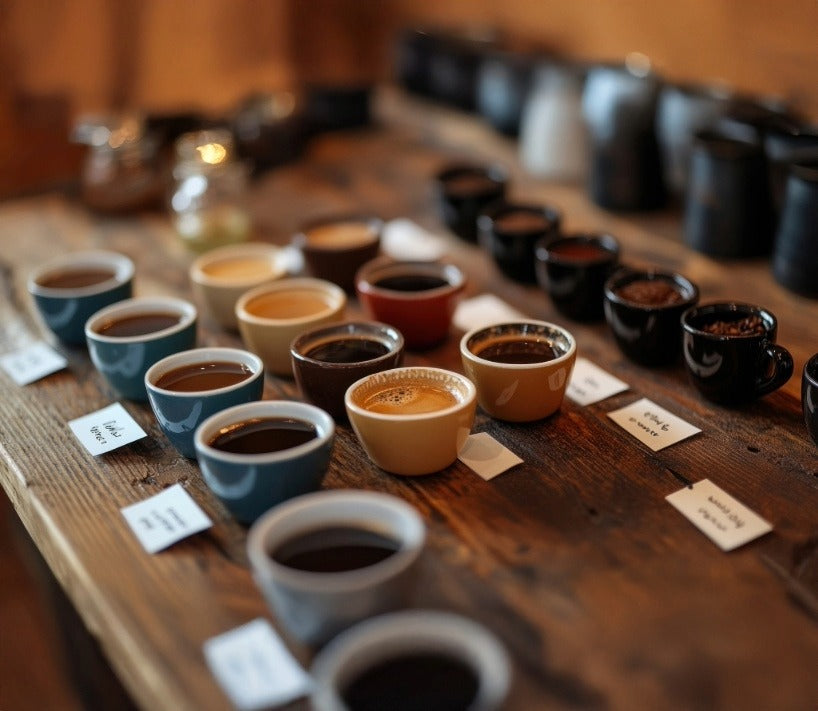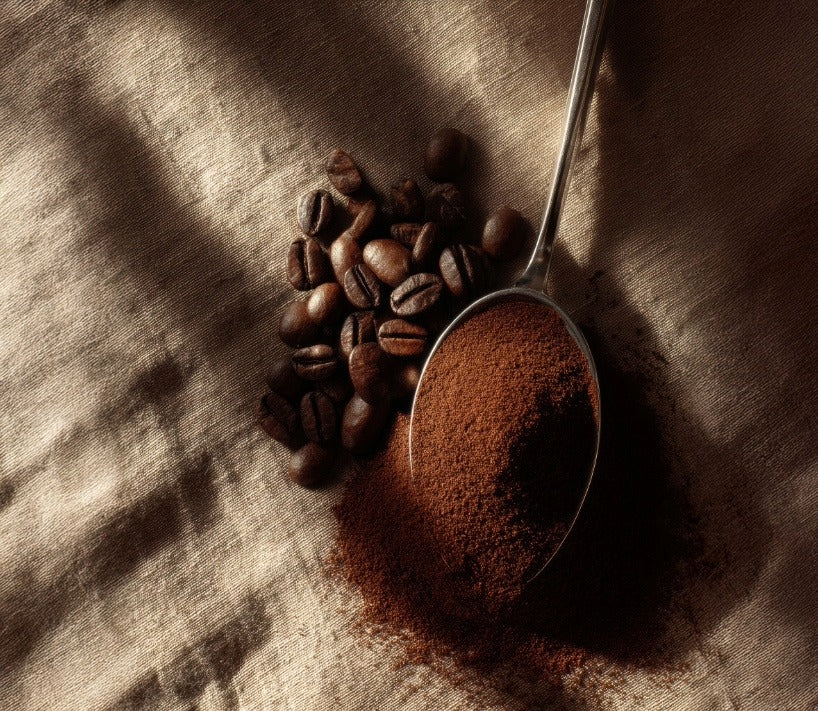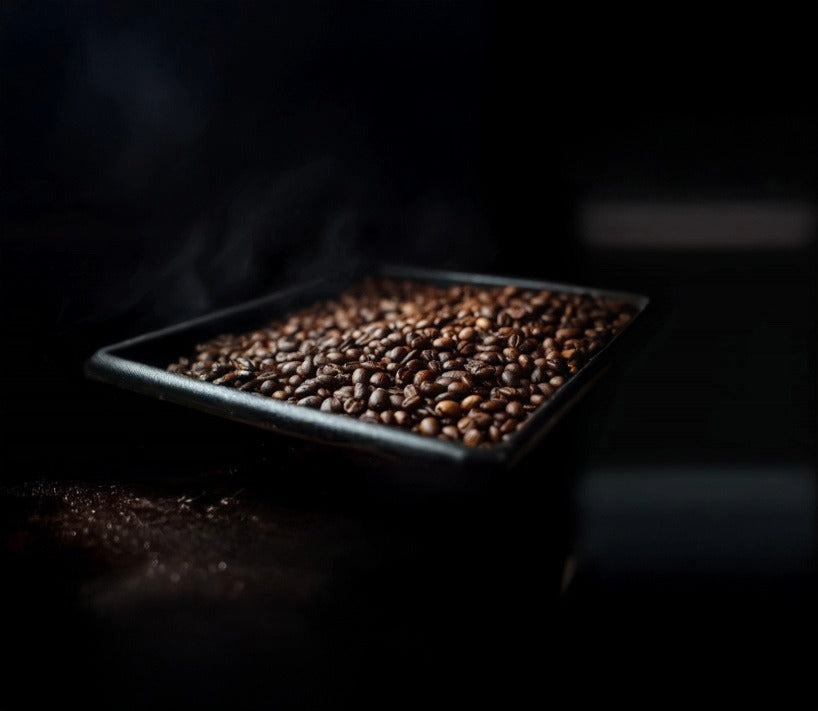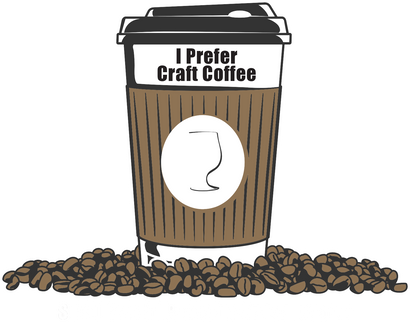How Fresh, High‑Scoring Air‑Roasted Top Coffee Turns “Meh” Mornings Into Pure Magic
April 21, 2025 4 min read
Goodbye Bitter Bean‑Water: How Fresh, High‑Scoring Air‑Roasted Coffee Turns “Meh” Mornings Into Pure Magic ☕
Waking Up Shouldn’t Taste Like Burnt Toast
I used to believe my mornings required a heroic “gulp‑and‑grimace” ritual—one swig of dark, bitter sludge and a polite smile so my co‑workers wouldn’t question my sanity. Sound familiar? If you’ve ever wondered why the office pot tastes vaguely like charred hazelnuts and regret, you’re not alone.
But what if I told you that the best craft coffee at home doesn’t have to bully your taste buds —or your wallet? In fact, with fresh, high‑scoring air‑roasted beans and a little know‑how, you can ditch the commercial brew that passes for coffee in break rooms everywhere, and save serious cash by brewing better coffee yourself.
Pull up a chair, top up that mug, and let’s talk about making your morning downright magical—no fairy dust required, just science, freshness, and a dash of common sense.
The Flavor Facts They Don’t Teach in Coffee 101
1. Why “Supermarket Dark Roast” Often Means “Super Bitter”
Most commercial roasters pile beans into huge drums, heat them until they’re practically smoking, then package them months before you ever see the bag. Oxygen, moisture, and time tag‑team those unlucky beans, degrading the volatile oils responsible for sweetness and aroma. What’s left? Bitterness and disappointment.
Air‑roasting flips that script entirely. Picture hot air levitating each bean, roasting it evenly—no scorched spots, no ash‑tray vibes. The result? Bright sweetness, silk‑smooth body, and flavor clarity you can actually describe without shrugging.
Rule of thumb: If it smells like burned popcorn, it’ll taste like burned popcorn. Choose air‑roasted to avoid the scorch.
2. Why “High‑Scoring” Isn’t Just Fancy Marketing
Coffee Quality Institute graders score beans on a 100‑point scale. Anything above 80 is “specialty,” but truly elevated coffees—think 86 +—deliver flavors you’ll want to journal about. When you buy specialty coffee online that flaunts a legit score, you’re paying for careful farming, meticulous processing, and impeccable green‑bean storage.
And because top lots are tiny, freshness is easier to control. Small batches = quicker turnover = beans that land in your mailbox days (not months) after roasting. That’s how you get the best tasting whole‑bean coffee instead of lifeless leftovers.
3. Air‑Roasted Math: Why Brewing at Home Saves You Money
Let’s crunch quick numbers. Your daily café latte runs, say, $5. Multiply by 20 workdays: $100. A high‑end 12‑oz bag of the best coffee online costs around $20, yields roughly 20 pour‑overs, and begs you to BYOM (Bring Your Own Milk). Even after adding filters and the occasional pastry splurge, your wallet still does a happy dance.
Pro tip: Brewing at home cuts costs and wasteful single‑use cups. Mother Nature approves this message.
4. Finding the Fresh Stuff Without Playing Bean Detective
I get it—Google “where can I buy fresh coffee beans near me” and a tidal wave of results smacks you in the face. Keep these checkpoints
| Fresh‑Bean Checkpoint | Why It Matters |
|---|---|
| Clear roast date (not “best by”) | Guarantees flavor peak & aroma fireworks. |
| Small‑batch/lot code | Signals quick turnover and minimal warehouse naps. |
| Shipping window (ideally same‑day or 24 hrs) | Less time in transit = brighter cup. |
| Q‑score disclosure | Transparency tells you it’s more than marketing fluff. |
| Roaster accessibility (email, chat, or text) | Education beats hype; ask anything! |
Tick those boxes and you’ll land beans worthy of the best specialty coffee online badge.
5. Gear Up Without Going Full Mad Scientist
You don’t need a $900 espresso robot (though espresso robots are undeniably cool). For drip and manual methods:
-
Burr grinder – even particles = even extraction. No pepper‑shaker blade grinders, please.
-
Scale – coffee loves precision. A $15 kitchen scale is life‑changing.
-
Brewer of choice – French press, pour‑over, AeroPress, moka pot…pick your flavor adventure.
-
Filtered water – because 98 % of coffee is water. Tap chlorine is the enemy of sweetness.
With those essentials, you’ll rival the top coffee delivered by fancy cafés—at pajama o’clock.
6. Dialing In: From “This Tastes Okay” to “Holy Wow”
Grind, ratio, water temp, bloom, pour cadence—yeah, there’s lingo. But think of it like driving: intimidating at first, second nature soon after.
-
Start ratio: 1 : 16 (e.g., 25 g coffee → 400 g water).
-
Water temperature: 200 °F (93 °C) if you’re measuring, “just off boil” if you’re eyeballing.
-
Grind setting: Medium‑fine for pour‑over, coarser for French press, fine for AeroPress.
-
Adjust: If cup tastes sour, grind finer or bump water temp. If bitter, grind coarser or shorten brew time.
You’ll hit that sweet spot where fruit notes pop and chocolate swirls in the finish. Suddenly your friends want to know why your house smells like a boutique roastery.
7. Storage Secrets: Keep Beans Alive, Not Fossilized
-
**Air‑tight container—**preferably opaque.
-
Cool, dry shelf (not the fridge)—condensation kills flavor faster than you can say “iced coffee.”
-
Buy little, buy often. The best espresso beans won’t stay best forever. Two‑week cycles are golden.
8. Sharing the Love: Great Beans Make Great Gifts
Remember that colleague who still thinks “dark, oily, pre‑ground bricks” are the pinnacle? Surprise them with coffee beans as a gift and a simple brewing starter kit. Instant upgrade to “office legend.” Looking for presents for coffee lovers? High‑scoring air‑roasted beans paired with a handwritten brew guide earns you MVP status every time.
Your Roadmap to a Happier, Cheaper, Tastier Morning
Let’s recap our magical mission in bite‑sized sips:
-
Freshness first. Check roast dates like you’d check milk expiry—religiously.
-
Air‑roasted only, please. Even heat equals even flavor equals no bitter surprises.
-
High‑scores rule. 86‑point beans aren’t hype; they’re sensory adventures.
-
DIY brewing saves cash. Café flavor minus café markup.
-
Simple gear, stellar results. Scale, burr grinder, decent brewer—done.
-
Stay curious. Ask roasters questions; most love geeking out as much as you do.
Still scratching your head about ratios, origin flavor notes, or whether a Gesha is a fancy cat breed? Reach out! Let’s have a genuine coffee conversation and land those taste buds where they belong—somewhere between “happily caffeinated” and “could write poetry about this cup.”
Your morning awaits its makeover. Time to wave goodbye to bitter bean‑water, step into the lush, lively world of best craft coffee online, and brew magic right in your kitchen. 🌟
Also in Best Coffee To Buy Online Education

What Makes Specialty Coffee Taste Better: The Real Reason
December 19, 2025 4 min read
I’ve also roasted thousands of pounds of air roasted coffee beans, shipped fresh roasted coffee beans online, and helped tons of people upgrade from “meh” to “HOLY FLAVOR” with tiny changes.

How To Choose Specialty Coffee Beans the Easy Way
December 18, 2025 4 min read
Fresh roasted coffee beans online should tell you when the beans were roasted… not when the bag expires in 2028.

Best Gift For Coffee Lovers: Why Beans Beat Gadgets
December 17, 2025 4 min read
Here’s the truth: the best tasting craft coffee at home doesn’t come from gear.
It comes from fresh, high-scoring specialty coffee roasted by someone who cares more about your morning cup than their own.
